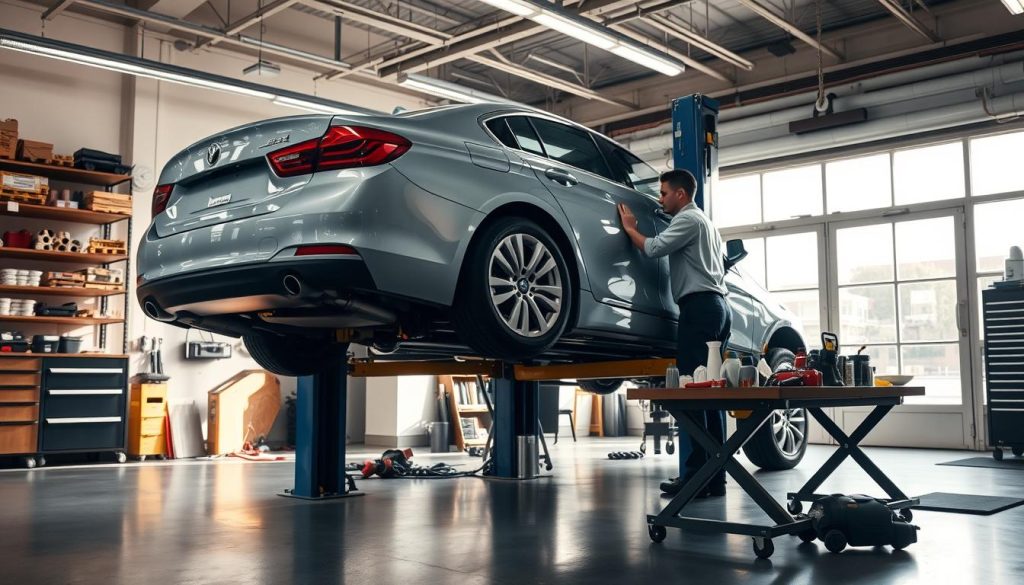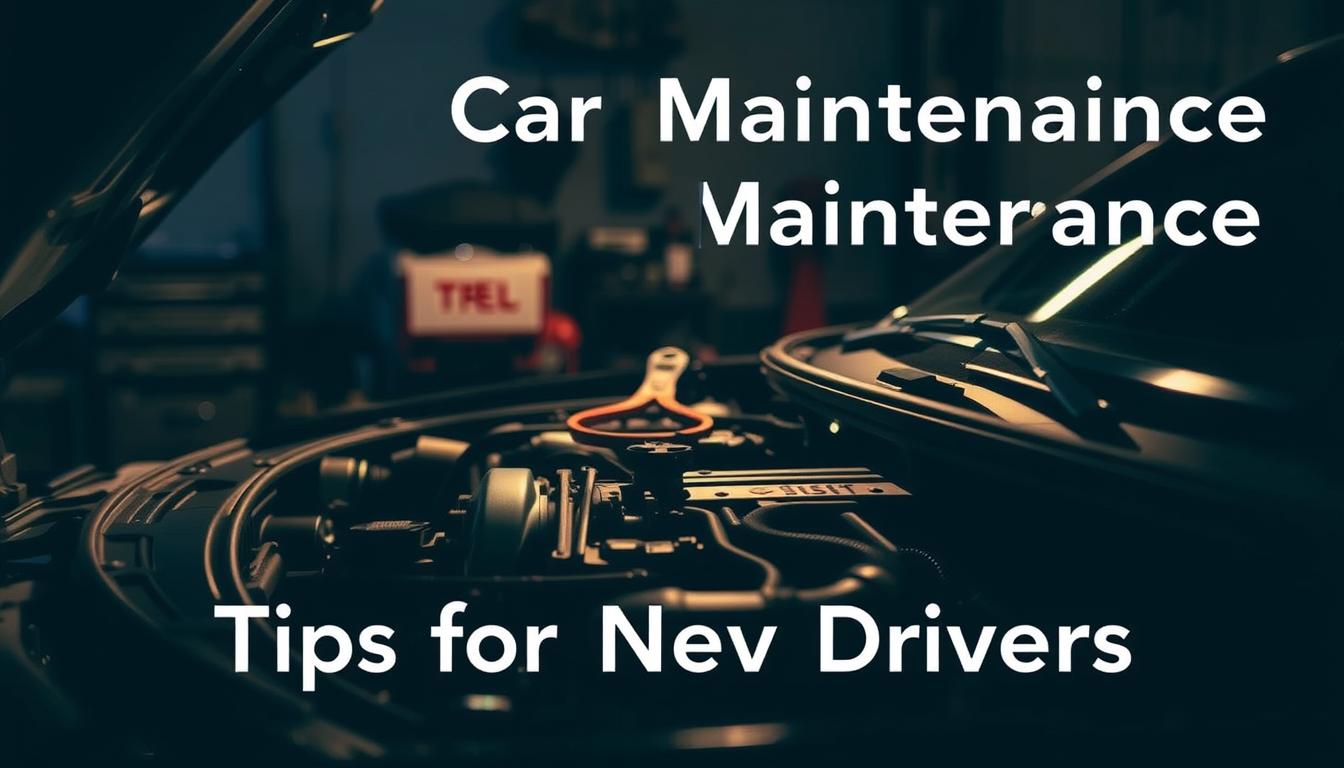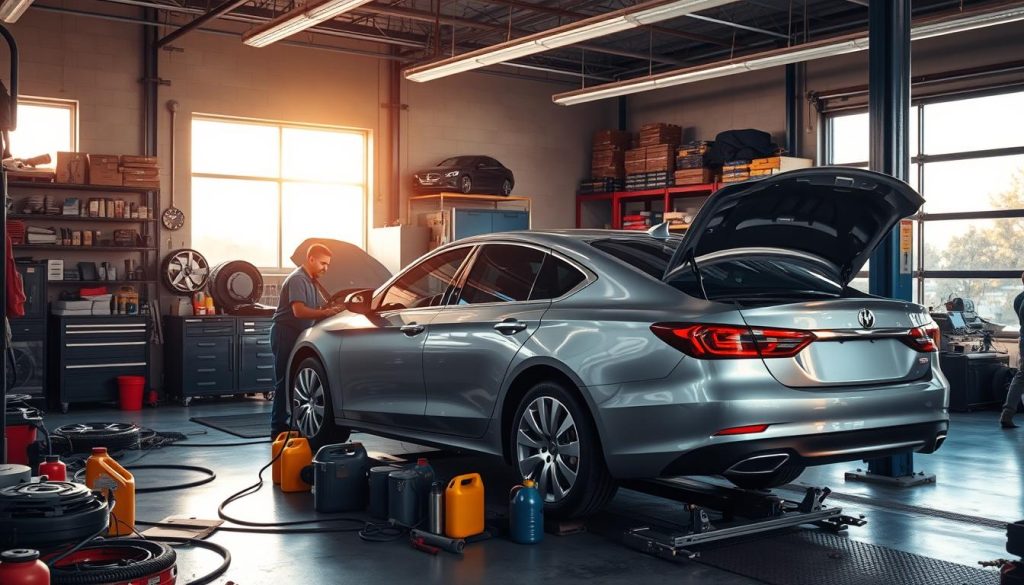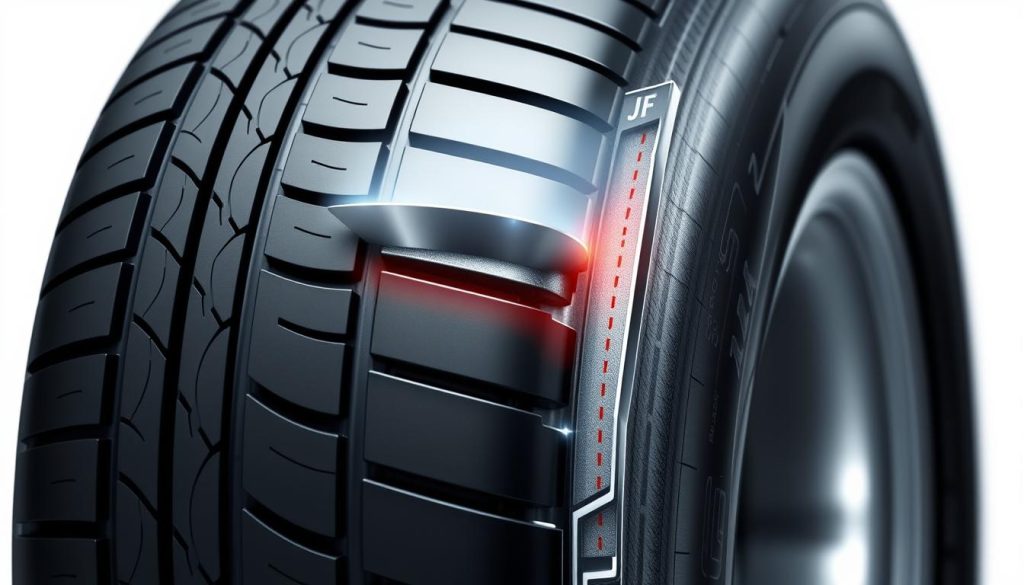For new drivers, knowing about car maintenance is key. Strange car noises are often ignored but are very important. They can tell us if our car is okay or if something needs fixing.
For example, a high-pitched hissing sound might mean there’s a leak. A chugging noise could mean the exhaust is blocked. Understanding these sounds helps us keep our cars safe and running well.
Not paying attention to these noises can cause big problems. A scraping sound when you brake means your brake pads are worn out. They need to be fixed fast.
At Heaven Automotive, we help you fix these noises. We make sure your car runs smoothly and safely. By listening to what our cars say, we can keep them in good shape.
Key Takeaways
- High-pitched hissing sounds may indicate a vacuum line leak.
- Chugging sounds from the exhaust could signal a blockage.
- Squealing when turning often points to low power steering fluid.
- Worn brake pads cause scraping or grinding noises when braking.
- Tire pressure should be checked every few gas fill-ups for safety.
- Ignoring the engine oil warning light can lead to costly damage.
- Regular inspections can help prevent serious mechanical failures.
Understanding Your Vehicle’s Basics
It’s important to know the basics of our vehicles. This helps us fix problems fast. We need to check the engine, transmission, and brakes.
Also, we should check the fluid levels. Low levels can cause big problems. And, knowing what the dashboard lights mean helps us avoid big repairs.
Familiarizing Ourselves with Key Components
Knowing our vehicle’s parts helps us take care of it. We should look for leaks or strange sounds in the engine. We need to know how the transmission works and check the brakes.
Any weird noise from the tires is a sign of trouble. Squealing means the tires are not full of air. Humming means the tread is wearing unevenly.
Learning How to Check Fluid Levels
Checking fluid levels is key to keeping our vehicle running well. Low oil, coolant, or brake fluid can damage our car. It’s also a safety risk.
Knowing how to check these levels helps our vehicle run smoothly. It also helps us understand our vehicle better. Taking a few minutes to check can save us from expensive repairs later.
Recognizing Dashboard Warning Lights
Dashboard warning lights tell us if our vehicle is okay. Knowing what they mean helps us fix problems fast. This saves us from expensive repairs.
If a light comes on, we should look in our owner’s manual. Ignoring these lights can cause big problems. Like engine failure or brake issues. By knowing what the lights mean, we keep our vehicle safe and running well.
The Importance of Regular Maintenance
Keeping our car in good shape is key. A good maintenance plan helps us not forget important tasks like oil changes. Not paying attention to strange sounds can cause big problems later.
Spotting issues early can save us money and keep us safe.
Creating a Maintenance Schedule
Having a maintenance plan keeps us on track. We should check a few things regularly:
- Oil changes every 5,000 to 7,500 miles.
- Brake checks every 25,000 miles or when they sound bad.
- Tire rotations every 5,000 to 6,000 miles.
- Belts and hoses checked yearly.
Following this plan helps us avoid sudden car troubles and keeps our car safe.
Knowing What to Check at Each Interval
Knowing what to look for at each check-up is important. We should:
- Check brakes for squeaks or screeches.
- Look for uneven tire wear.
- Make sure fluids are at the right levels.
This helps keep our car running well and safely, avoiding big problems.
Finding a Reliable Mechanic
Finding a good mechanic is very important. A good mechanic can find and fix problems early. Heaven Automotive is a great example of the service we should look for.
They help keep our car running well for a long time, saving us from expensive fixes.

Essential Fluid Checks and Changes
Keeping our vehicle fluids in check is key for its health. Regular checks help us spot problems early. This can save us from expensive fixes later. We need to watch engine oil, coolant levels, and brake fluid closely.
The Importance of Engine Oil
Engine oil keeps our car’s engine running smoothly. It stops parts from rubbing together and getting damaged. Always check oil levels after the engine cools down for 10 minutes.
The oil should be close to the top mark on the dipstick. If it’s low, it might mean a leak or the engine is burning oil. Look at the oil’s color and feel. Yellow or amber means it’s good. But dark colors mean it’s time for a change.
Monitoring Coolant Levels
Coolant helps keep our engine from getting too hot. We should check it every 50,000 miles or more if we see leaks. Always check coolant when the engine is cool to avoid burns.
Keeping coolant levels right helps our engine run well. It also stops sudden breakdowns.
Checking Brake Fluid and Power Steering
Brake fluid is as important as engine oil. It should be clear. If it’s dirty, it can cause brake problems. Regular checks keep our brakes working right.
We also need to watch power steering fluid. Low levels might mean a leak. Checking these fluids keeps our car safe and running well.
Tire Maintenance for New Drivers
Tire care is key for new drivers. It keeps us safe and our car running well. Checking tires often helps avoid problems like uneven wear.
Understanding Tire Pressure
Tire pressure is very important for safety. We should check it monthly with a good gauge. Remember, cold tires give the right pressure, not warm ones.
Low tire pressure is dangerous. It can make crashes three times more likely. Always check tire pressure when it’s cold.
The Importance of Tread Depth
Tread depth is critical for safe driving. Tires need at least 4/32” tread to be safe. Less than 2/32” means they’re too worn and need to be replaced.
At 5/32”, tires lose grip on wet roads. This makes stopping hard. Always check tread depth to keep tires in good shape.
When to Rotate and Replace Tires
Rotating tires every 5,000 to 7,000 miles is important. It keeps tires even and lasts longer. If tires vibrate or wear unevenly, they might need balancing or alignment check.
Regular rotations make driving smoother and quieter. It’s good for comfort and performance.

Braking Systems: What We Need to Know
Knowing how our brakes work is very important for staying safe on the road. Spotting worn brake pads and keeping brake fluid at the right level helps a lot. Regular checks can stop big problems before they start. Let’s look at why these brake checks are so important.
Signs of Worn Brake Pads
Worn brake pads make sounds that tell us they need help. A squeaking or squealing noise means it’s time to change them. If we ignore this, we might hear a grinding sound, which means they’re gone and we need to act fast.
A vibrating brake pedal or a car pulling to one side when we brake means the brakes are wearing unevenly. This is a sign we need to check them right away.
Understanding Brake Fluid Maintenance
Keeping brake fluid in good shape is key to our safety. We should change the fluid and clean the system every two years. This keeps air out and stops corrosion.
Checking brake fluid regularly helps avoid brake fade. This is when the fluid gets too hot and our car can’t stop well. If the fluid level goes up, it might mean there’s a leak or something’s wrong.
The Importance of Regular Inspections
Regular checks are vital to catch problems early. They can find rust that causes grinding noises. While driving usually fixes this, if it keeps happening, we need a mechanic to look at it.
By keeping up with regular inspections, we make sure our brakes work their best. This makes driving safer and more enjoyable for everyone.
The Role of Battery Care
Battery care is very important for our cars to work well. A good battery helps avoid sudden stops and makes our cars last longer. Knowing how to check the battery, keep connections clean, and when to change it makes driving better.
How to Test Battery Health
It’s key to test the battery health often. A bad battery might make a fast clicking sound or dim headlights that get brighter when we speed up. We should check the battery every month.
Look for a voltage over 12.5 volts and a specific gravity above 1.240. These signs mean the battery is okay.
Importance of Clean Battery Connections
Clean connections are vital for the battery to work right. Corrosion on terminals can mean the battery is not charging right. Keeping them clean helps the battery last longer and prevents starting problems.
When to Replace the Battery
Knowing when to change the battery is important. A battery usually lasts 3 to 5 years. Look out for signs like a swollen battery, strange smells, or if it can’t hold a charge.
Getting quotes from different shops helps find a good battery with a good warranty. This gives us peace of mind.
Staying Safe on the Road
Staying safe on the road is more than knowing our car. It’s about being ready for emergencies. We need a plan for breakdowns or emergencies on the road.
Knowing how to call for help makes tough times easier. It helps us get back on the road fast.
Tips for Emergency Preparedness
To be ready, we can make a road trip emergency kit. It should have tools, first-aid, extra fluids, and snacks. Being ready helps us fix small problems ourselves.
This way, we avoid getting stuck in bad situations.
Understanding Basic Roadside Assistance
It’s important to know what roadside help offers. Services like tire changes, jump-starts, and towing are common. Knowing these helps us feel confident in emergencies.
Building a Road Trip Emergency Kit
Right preparation keeps us safe on the road. With an emergency kit and knowing when to ask for help, we face challenges head-on. Let’s prepare well and enjoy our trips with peace of mind.



